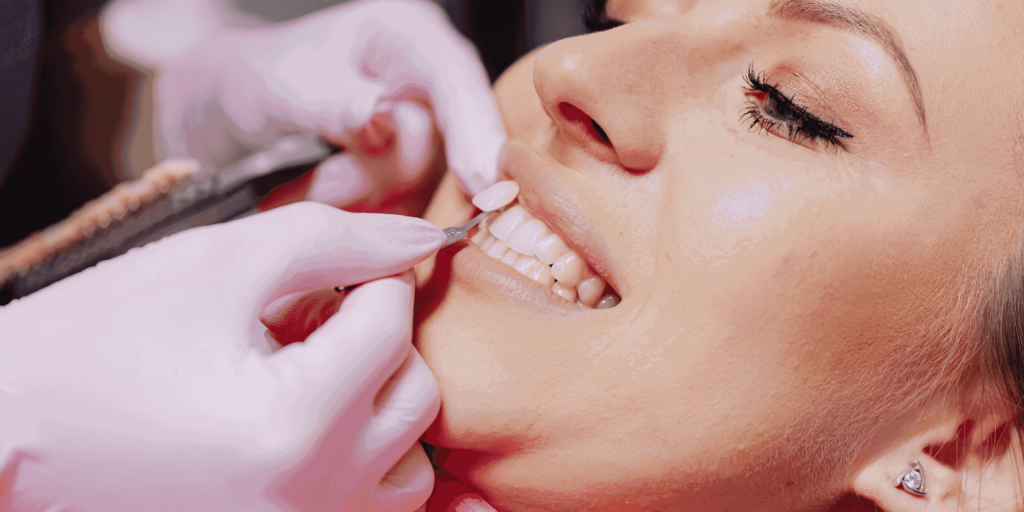With the desire to have an outstanding smile, people often ask, is it possible to whiten veneers? Porcelain veneers, also known for their revolutionary effect on people, cause them to wonder about the things required for brightening. Let’s unveil the porcelain veneer kingdom to discover whitening veneers, how well they work, and what should be done to improve their brightness.

The fundamental nature of porcelain veneers understanding
First, one needs to understand what veneers are made of before discussing whitening methods. This attachment is made from fine-quality ceramic material; it has the property of resisting staining caused by coffee, red wine and tobacco. Porcelain’s non-porous nature provides durability and retains luminosity over some time.
The Limitations of Traditional Teeth Whitening
Traditional teeth whitening techniques work best on natural teeth as they may not change veneers made of porcelain. Trying to bleach veneers using traditional methods, such as whitening the same through normal agents and gels, may result in unsound outcomes that could cause harm.
Myth Busting: Over-the-Counter Solutions
In the midst of the mystery regarding how veneers can be whitened, one finds that there are many over-the-counter solutions promoted as effective. Nevertheless, it is important to be careful since these products may not be designed for the particular demands of porcelain. The question is whether whitening strips can be used on veneers. The solution is quite complicated, and trusting professional advice to the self-experimentation seems important.
Professional Alternatives for a Whiter Smile
Whitening porcelain veneers directly may not be an easy task, but one can resort to professional alternatives that guarantee a brighter smile. In case some discolouration is observed, it should be brought to the dentist’s attention. Surface-level stains can be treated with techniques such as microabrasion or gentle polishing without damaging the structure of the veneers.
Maintaining Long-Term Radiance
To understand how to whiten your veneers, it is important to focus on avoidance and maintenance. Good oral hygiene practices, such as brushing and flossing regularly, help prevent extrinsic stains. Steering away from darkly pigmented foods and beverages is as vital for preserving the natural beauty of your porcelain enhancements.
Conclusion: Navigating the Whiteness Dilemma
In short, although porcelain veneers can pose some challenges regarding direct teeth whitening, one needs to understand the limitations and obtain professional help in maintaining them. Incorporating the intrinsic charm of a beautiful set of porcelain veneers and practising preventative care secures your smile for years to come. Therefore, let your smile glory bright with an assurance that veneers’ lastingness and lustre were made to stand the challenges for a long time.
Frequently Asked Questions (FAQ)
Q1: Do Conventional Teeth Whitening Methods Whiten Porcelain Veneers?
A1: Conventional teeth whitening procedures that usually apply various bleaching agents and gels may not work for porcelain dental veneers. Due to the fact that porcelain is a different material than natural tooth enamel, it can be very dangerous if you try to bleach veneers with conventional methods because there may be uneven results and structural damage of this kind of material.
Q2: Can Over-the-counter Whitening Products be Safe for Porcelain Veneers?
A2: Although there are many over-the-counter whitening products assuring effectiveness, carefulness is necessary. Some of the above-discussed solutions do not meet porcelain requirements and may contain abrasives that can negatively impact veneers’ strength. It is therefore advisable to consult medical professionals in preference of self-experiments due to the safety and durability of your dental investments.
Q3: Can Whitening Strips Be Used on Porcelain Veneers?
A3: The application of whitening strips on porcelain veneers is a rather complicated issue. Naturally, porcelain does not react to whitening strips, as is the case with natural teeth. Furthermore, since veneers have a smooth surface and the adhesive property of strips is poor, we cannot be sure that they work properly on them. One is, therefore, required to consult with a dentist for possible alternatives one can use in order to sustain the sheen of veneers.
Q4: How Does One Long-Term Maintain the Shine of Porcelain Veneers?
A4: Remember to practice good oral hygiene for the longevity of porcelain veneers. Proper oral hygiene, such as regular brushing and flossing, prevents extrinsic stains, while professional cleaning is essential for eliminating plaque buildup or other discolouration. The intake of highly coloured foods and drinks also helps in maintaining the natural splendor of your porcelain improvements.
Q5: Whether porcelain veneers can be whitened with a professional procedure in the case of discolouration?
A5: If discolouration happens, there are professional dental options available for improving the whiteness of porcelain veneers. Such techniques as microabrasion or mild polishing may be prescribed by a dental practitioner to remove superficial stains without harming the structure of veneers. Consulting with your dentist assures an individual approach to preserving the visual quality of a smile.

